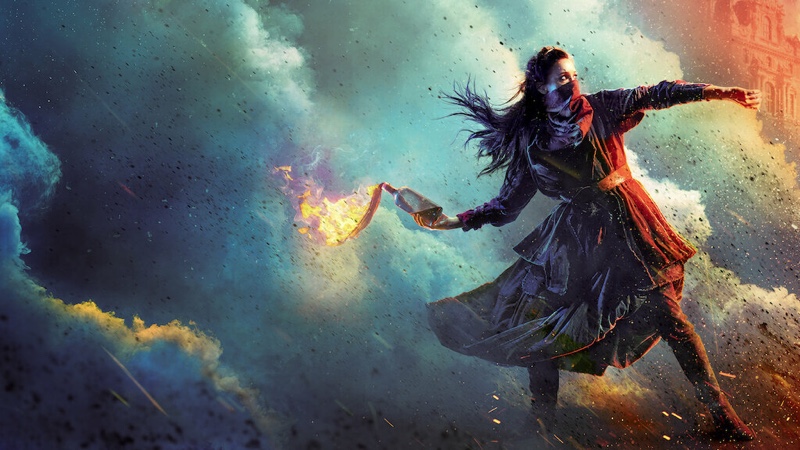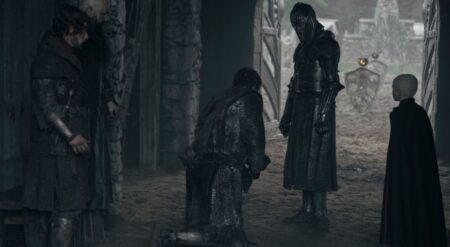
La Révolution is an alternate history drama/horror series on Netflix. In the late 18th century, the French citizenry was fed up. Taxes were too high, living conditions too poor, and the nobility walked all over them without fear of reprisal. It had gotten to be too much, and it had gone on for far too long. Just as the powder keg that would become The French Revolution is about to explode, a strange new disease makes it’s way to France. Its presence will be the final spark that will light the fuse of revolution.
It has long been said that the rich feed upon the poor, that they grow fat on their misery and servitude. While this is generally used as a metaphor, La Révolution takes this saying a step further as the nobility of a region in France are infected by a disease known as the Blue Blood. It gifts those who come under its power with strength and resilience to most mortal wounds while cursing them with a hunger for the blood and flesh of their fellow humans. And it is against this enemy that a ragtag band of commoners, a doctor, and a disenfranchised noble desperate to protect her sister must unite to stop. But they may already be too late.
The presentation that La Révolution utilizes for its story is one of historical fact. Narrated by one of the show’s characters, they speak at the beginning of each episode as if this is what actually happened. As if humanity has simply forgotten, or chosen to forget, the true horror of the events that tore France, and ultimately all of Europe, apart.
As someone who has learned a bit about the French Revolutionary period, this presentation, while a little hokey, was well-delivered. Given that the French Revolution is often considered one of the bloodiest revolutions in history, with various groups turning on each other and numerous acts of utter cruelty taking place regularly, the concept that much of its brutality was brought on due to a sort of mystical disease is appealing.
La Révolution centers around Elise, a countess and daughter of the ruling noble, and Joseph, a doctor with a bit of a checkered past who works at the local prison tending the inmates. The majority of the show’s narrative revolves around these two individuals as they are slowly drawn into the worsening conditions within their county.
The narrative presents Elise as the exception to every rule in the nobility. She speaks on behalf of the people, opposing the injustices heaped upon them as well as being shrewd and an excellent shot with a pistol. Everything a noblewoman would not be expected to be. She is also one of the few people who treat her sister Madeleine with dignity, as she is incapable of speech and suffers from fits. This causes many to believe she should be under the care of an asylum. The approach to how Madeleine’s condition is addressed is one of my biggest complaints about La Révolution.
When Madeleine and others who are disabled are interacted with, the script often falls back on the use of ableist terminology to describe them. While this is mostly used by those who look down on them unfairly, and probably with the intent to show their inconsiderate attitude toward them, it would be nice if it hadn’t been there. The usage is viewed by many within that community as hurtful, and there are plenty of other ways to show disdain than resorting to language that can hurt the viewer as well.
While Elise struggles within the confines of her societal status, Joseph is brought in from the other side of the social ladder when he becomes involved with the murder of a young girl. After examining her body, he becomes convinced that the man who is accused of her killing is not the real murderer. This conclusion soon has Joseph stumbling into the ever-growing conflicts around him.
The overall plot of La Révolution delivers some interesting twists and turns. As the situation between the nobility and the peasantry becomes jumbled with the spreading epidemic of the Blue Blood, there are numerous times I really didn’t know where the story would land. And its final episode provided a truly surprising finale I never would’ve seen coming.
While the overall narrative was original enough to hold my interest, the moment-to-moment writing is just fine. The majority of characters feel naturally delivered and are able to stay consistent with their decisions. However, none of them ever really managed to get me invested in their individual stories. They served more to move the plot along than as a reason to watch the show themselves.
As for its setting, La Révolution delivers late 18th century France in a way that will come across as believable to any person not versed in the era. I myself only have a passing knowledge of the nitty-gritty of that period, and by and large, it felt mostly authentic. The biggest standout problem was how remarkably accurate these people were with guns before a time when rifling barrels were common.
When all is said and done, La Révolution delivers a unique take on a tumultuous period of human history. It is brutal at times and delivers a worthwhile story, even if none of its characters ever truly shine.
La Révolution is streaming now on Netflix.
La Révolution
-
Rating - 7.5/107.5/10
TL;DR
When all is said and done, La Révolution delivers a unique take on a tumultuous period of human history. It is brutal at times and delivers a worthwhile story, even if none of its characters ever truly shine.






